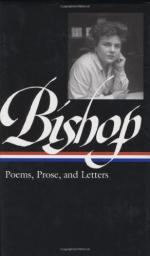|
This section contains 8,162 words (approx. 28 pages at 300 words per page) |

|
“Erasing the Maternal: Rereading Elizabeth Bishop,” in The Iowa Review, Vol. 22, No. 2, Spring/Summer, 1992, pp. 82-103.
In the following essay, Wallace examines the maternal presence in Bishop's poetry.
… a perfect erasure disappears along with what is erased. For an erasure to be present for us, we must know that something was there; we must see the traces of the erasure: blottings, blurrings, indentations on the page or in the landscape. Erasure is the forceful writing of loss, absence and rejection. Because we crave to ‘be’—in body, in works, in writing—we can never view such erasures dispassionately, as mere blank space.
—Stephen Owen, Remembrances: The Experience of the Past in Classical Chinese Literature
It is raining here, in upstate New York. I am rereading after some months Elizabeth Bishop's story, “Memories of Uncle Neddy,” which begins with Bishop in Brazil, in Rio in the rainy season: “It...
|
This section contains 8,162 words (approx. 28 pages at 300 words per page) |

|


